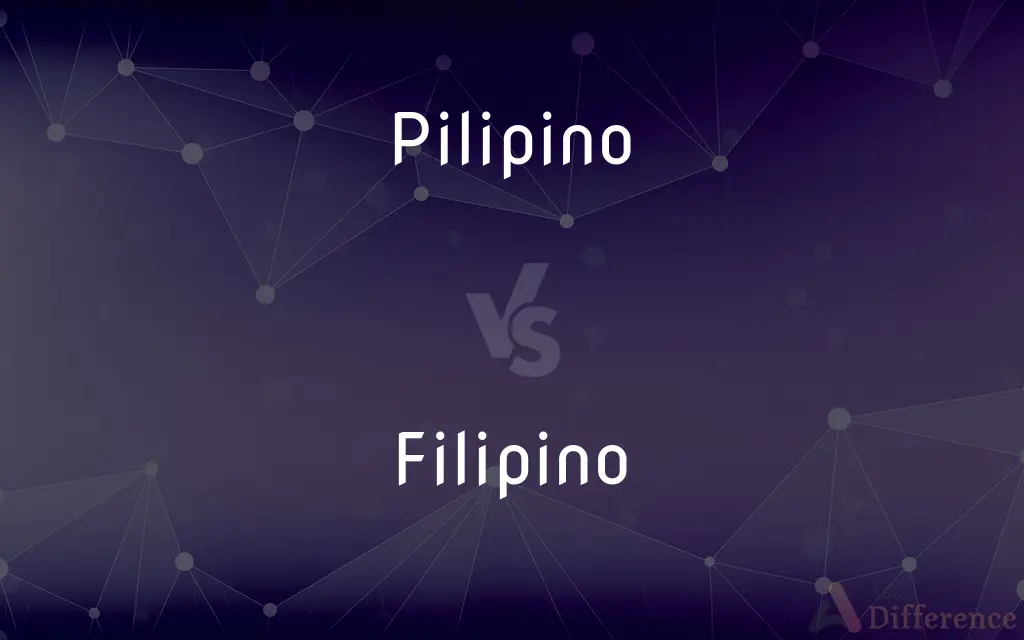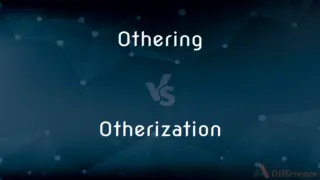Pilipino vs. Filipino — What's the Difference?
By Tayyaba Rehman — Updated on November 6, 2023
Pilipino is the term for the people of the Philippines and their language in Tagalog. Filipino refers to the national language and identity in English and official contexts.

Difference Between Pilipino and Filipino
Table of Contents
ADVERTISEMENT
Key Differences
Pilipino and Filipino both relate to the Philippines but in different linguistic contexts. Pilipino is the Tagalog word for the people of the Philippines and the language they speak. This term is rooted in the Tagalog language itself. Filipino, meanwhile, is the English-adapted term used to describe the national language based on Tagalog and the people of the Philippines, as recognized in the Philippine constitution.
The language Pilipino was developed from Tagalog and is one of the many languages spoken in the Philippines. Filipino, as a language, is the standardized form of Tagalog and incorporates elements from other Philippine languages and even includes borrowings from Spanish and English. As a designation for the people, Filipino is gender-neutral and is also used internationally.
Pilipino represents a cultural identity closely tied to the Tagalog-speaking regions. Filipino encompasses a broader national identity, acknowledging the diversity of the Philippine archipelago. The Philippine government promotes Filipino as the national language, which symbolizes unity among the different ethnic groups.
In academic settings, Pilipino often refers specifically to the Tagalog-based curriculum taught in schools. The term Filipino is more inclusive, representing the evolving language that reflects various sociolinguistic changes, including the adoption of terms from regional Philippine languages and even technological jargon.
Pilipino as a term is sometimes perceived as more traditional or even nationalistic, focusing on Tagalog heritage. Filipino is seen as a progressive term that aligns with the modern and inclusive direction of the Philippines, especially in international discourse and when referring to the citizenship of the country's people.
ADVERTISEMENT
Comparison Chart
Language Context
Based on Tagalog, used in informal contexts
Official language of the Philippines
Usage
More commonly used within the Philippines
Used both domestically and internationally
Alphabet
Uses the Tagalog alphabet
Uses the Filipino alphabet with 28 letters, including Spanish and English characters
Linguistic Scope
Refers to the language and people in Tagalog
Refers to the national language and people
International Recognition
Less internationally recognized
Officially recognized and used term
Compare with Definitions
Pilipino
A person of Philippine origin or descent.
She is a proud Pilipino, with a deep love for her heritage.
Filipino
A person from the Philippines or of Filipino descent.
He identifies as Filipino, celebrating both his culture and nationality.
Pilipino
A word used within the Tagalog language to describe the Filipino people.
Ang mga Pilipino ay kilala sa kanilang pagiging hospitable.
Filipino
The official language of the Philippines, derived from Tagalog.
Filipino includes words from various regional languages in the Philippines.
Pilipino
The national language of the Philippines based on Tagalog before the term Filipino was adopted.
Pilipino is taught as a subject in schools throughout the Philippines.
Filipino
The national identity or citizenship of a person from the Philippines.
As a Filipino, she has the right to vote in Philippine elections.
Pilipino
A term used to refer to anything related to the indigenous aspects of the Philippines.
The Pilipino culture is rich with traditions and festivities.
Filipino
A term used internationally to describe the culture and people of the Philippines.
Filipino artists are gaining recognition on the global stage.
Pilipino
Used in a cultural context within the Philippines to refer to the Filipino people.
Pilipino craftsmanship is admired for its intricacy and attention to detail.
Filipino
Relating to the Philippines, the Filipinos, or their language.
Pilipino
Variant of Filipino
Filipino
A native or inhabitant of the Philippines, or a person of Filipino descent.
Pilipino
Variant of Filipino
Filipino
The national language of the Philippines, a standardized form of Tagalog.
Pilipino
The Filipino language.
Filipino
A native or inhabitant of the Philippines.
Filipino
A person of Filipino ancestry.
Filipino
The Austronesian language that is based on Tagalog, draws its lexicon from other Philippine languages, and is the official language of the Philippines.
Filipino
Of or relating to the Philippines or its peoples, languages, or cultures.
Filipino
Of or relating to the Philippines or its people or customs.
Filipino
Of or relating to the language of the Philippines.
Filipino
A native or inhabitant of the Philippine Islands, specif. one of Spanish descent or of mixed blood.
Then there are Filipinos, - "children of the country," they are called, - who are supposed to be pure-blooded descendants of Spanish settlers. But there are few of them without some touch of Chinese or native blood.
Filipino
The official language of the Philippines, based on Tagalog. It draws its lexicon from other Philippine languages.
Filipino
A native or inhabitant of the Philippines
Filipino
Official language of the Philippines; based on Tagalog; draws its lexicon from other Philippine languages
Filipino
Of or relating to or characteristic of the Philippines or its people or customs;
The Philippine President
Our Filipino cook
Filipino
Pertaining to or relating to the Philippines or its people.
Filipino cuisine is a delicious blend of indigenous, Spanish, and Asian influences.
Common Curiosities
Can I use Pilipino and Filipino interchangeably?
In the context of the language, they are not interchangeable as Filipino is the official term.
Is Pilipino still taught in schools?
Yes, but it is now more commonly referred to as Filipino.
What is Pilipino?
Pilipino refers to the people of the Philippines and their language in a traditional sense.
Are Pilipino and Filipino the same language?
Filipino evolved from Pilipino, which was based on Tagalog; they are effectively the same but Filipino is more inclusive of other languages.
Why was the term Filipino chosen over Pilipino?
Filipino was chosen to reflect the Philippines' diverse languages and cultures.
Do Pilipino and Filipino have the same alphabet?
No, Pilipino uses the Tagalog alphabet, while Filipino includes additional characters.
Is there a difference in pronunciation between Pilipino and Filipino?
The pronunciation is similar, but Filipino incorporates foreign sounds not found in Pilipino.
Are there non-Tagalog words in Filipino?
Yes, Filipino includes words from various Philippine languages.
What is Filipino?
Filipino is the national language of the Philippines and refers to its citizens.
Which term should I use when referring to someone from the Philippines?
Filipino is the most widely accepted and used term internationally.
What should I use when writing about Philippine culture?
Filipino is the more inclusive term for the diverse cultures within the Philippines.
Is the term Pilipino outdated?
It's not outdated but has been largely replaced by Filipino in official and international discourse.
How do Filipinos feel about the terms Pilipino and Filipino?
Opinions vary; some prefer Pilipino for its nationalistic tone, while others prefer Filipino for its inclusivity.
Does Filipino include English words?
Yes, English has had a significant influence on Filipino.
Which term is more popular in academic research?
Filipino is the term commonly used in academic and official contexts.
Share Your Discovery

Previous Comparison
Othering vs. Otherization
Next Comparison
Hawkish vs. DovishAuthor Spotlight
Written by
Tayyaba RehmanTayyaba Rehman is a distinguished writer, currently serving as a primary contributor to askdifference.com. As a researcher in semantics and etymology, Tayyaba's passion for the complexity of languages and their distinctions has found a perfect home on the platform. Tayyaba delves into the intricacies of language, distinguishing between commonly confused words and phrases, thereby providing clarity for readers worldwide.















































